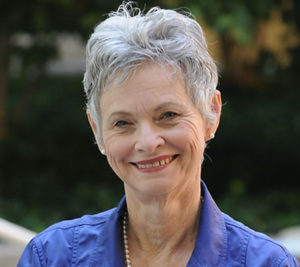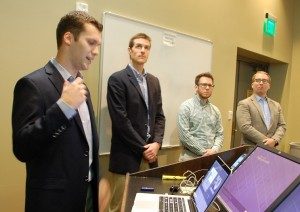By Kara Sherrer
“I claim that innovation is like a three-legged stool. If you take away one leg, it’s going to fall. The problem is the legs are very different.”
The three legs of Marie Thursby’s metaphorical stool are business, law, and technology, and they form the foundation of her course “Innovation Realization.” The Adjunct Professor of Management designed the course to bring together graduate students from these three disciplines in order to teach them about innovation and entrepreneurship within a highly technical environment.
The Course

Professor Marie Thursby
In past years, class enrollment has been open to both MBA and JD candidates as well as Ph.D. students in engineering. The business ideas are based on the Ph.D. candidates’ thesis research; past projects have included shape memory polymers, kidney stents, a new method of making carbon nanotubes, a disposable endoscope, and more.
The MBA and JD students help the Ph.D. candidates figure out possible commercial applications for their research findings, and how it might be brought to market. “A lot of the success of a product hitting the market depends on the intersection of these disciplines,” Thursby said.
The course — which runs for two semesters, or four mods, depending on the graduate school — covers topics such as intellectual property, identifying market opportunities, analyzing the markets and how to enter them, some entrepreneurial finance, and customer discovery. Thursby brings in guest lecturers from inside and outside the university to speak to their areas of expertise. Melinda Allen from the Vanderbilt Business Leadership Development Program helps the students hone their leadership and teamwork skills throughout the year.
Students present on their progress at the end of both the fall and spring semesters. The audience includes experts from the local legal and entrepreneurial communities, as well as deans and other figures from around the university.
However, Thursby emphasizes that the main objective of the course is teaching the students, and not launching a viable product, and she notes that such complicated technologies can take 10 or 20 years to fully develop. “The course is educational. The purpose is not to get something on the market,” she affirmed.
The Origins
Thursby originally got the idea for such a class during her time at Purdue University, when she helped a professor of engineering match up one of his Ph.D. candidates with two MBAs for a project. The students loved working together, and Thursby began building the idea of interdisciplinary graduate student teams into a full academic course.

Student present on their Innovation Realization projects (Dec. 2015)
When she moved to Georgia Tech University, she expanded the idea into a partnership with Emory University and dubbed the class TI:GER: Technological Innovation: Generating Economic Returns. The class was a hit, and hundreds of students have passed through the TI:GER program so far. Some TI:GER alumni from the area even come to judge the final presentations at Vanderbilt.
Thursby moved to Nashville three years ago, and she connected with faculty at Vanderbilt and floated the idea of starting a class similar to the TI:GER program. Vanderbilt Business Dean Eric Johnson loved the idea, bringing Thursby on board as an adjunct and providing funding to start the “Innovation Realization” class.
The Future
Over the past three years, the Innovation Realization course has been so successful at Vanderbilt that Thursby is expanding it next year. She’ll be bringing in Robert Webster, Associate Professor in Mechanical Engineering, to teach the class with her for the full year. If the teams need prototyping support, Webster will pair them with senior undergraduate students working on capstone projects, how will do the prototyping for the teams.
The course enrollment will be opened up to Ph.D. candidates in the sciences, as opposed to only mechanical engineering. The class will also be renamed “From Academic Insight to Entrepreneurial Impact,” and receive addition funding from the Provost’s office.
However, Thursby says that this is merely an extension of the “Innovation Realization” course, and that the course content won’t fundamentally change. “Everything that was in Innovation Realization will be in this,” she said.
To learn more about getting an MBA at Vanderbilt Business, visit the program page or request information.